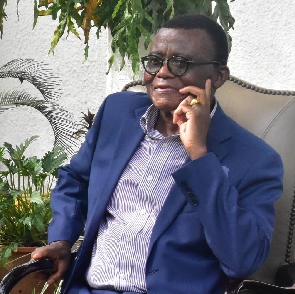Professor Baffour Agyeman-Duah, a former United Nations Senior Governance Advisor, has reiterated calls for the amendment of the 1992 Constitution, especially portions, which gives the President power to appoint as many ministers as possible he or she so desires.
According to him, such an amendment was necessary to help place a cap on the number of ministries and ministers a sitting president could make.
His call comes on the back of recent calls by a section of the public for President Nana Addo Dankwa Akufo-Addo to downsize his government, especially considering the current economic difficulties facing the country.
Calls for the amendment of certain aspects of the Constitution have also been intensified in recent times with various individuals and groups, including civil society organisations, social and political commentators and religious leaders, demanding immediate action.
Contributing to discussions on Ghana’s political situation, Prof Agyeman-Duah indicated that it was time the country took a look again at the Constitution and made the necessary amendments to conform to the current development needs of the country.
He said, even though the Constitution had served the country well in the past 30 years, there was no denying the fact that certain aspects no longer served their purpose and must, therefore, be amended to help address current development deficiency.
The former United Nations Senior Governance Advisor also emphasised the need for strong systems to hold people accountable for their actions, indicating that democracy only thrived in States where there was strict enforcement of laws.
“Democracy in the western world has been working only because there is strict enforcement of the law. It tells you that system is very important, and I think for many years we have failed in putting in place a system that works, and our own character turns to undermine the enforcement,” he said.
Prof Agyeman-Duah also called for a change in the character of Ghanaians to enable them to contribute meaningfully to the development of the country.
According to him, Ghanaians had become “morally bankrupt” which he said did not auger well for building strong systems.
“Ghanaians who in this country misbehave and mismanage, if you send people abroad, their behaviour and everything is absolutely different, I have observed in many of my travels at the airports in Europe and America, Ghanaians are orderly, patient, waiting to be checked in.
“The same Ghanaian arrives at the Accra airport, and the behaviour is completely different. So, we are creating a system that does not enforce the laws or the rules or regulations,” he bemoaned.
Benjamin Kumbuor, a Visiting Scholar at the University of Ghana Law School, stressed the need for the country to take a relook at how political parties were funded.
According to him, political parties had become breeding grounds for corruption and could only get worse if nothing was done to halt it.
The former lawmaker charged Ghanaians to demand more from their leaders and hold them accountable when they failed.
General News of Tuesday, 14 February 2023
Source: GNA
We need to amend constitution to place limits on ministerial appointments, others — Prof Agyeman-Duah
Entertainment
















